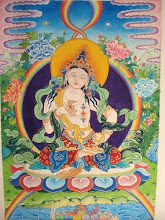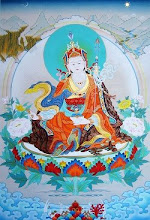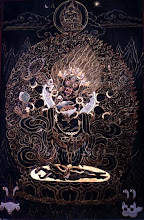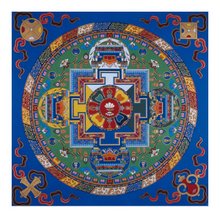Half-baked intro to Zen
Filmmaker Jon Braeley did a couple of things right with this one-hour documentary on Japanese Zen Buddhism. He hired a skilled shakuhachi player for his soundtrack and as cameraman was able to take advantage of some wonderfully photogenic locations, including Sojiji, one of Soto Zen's main monastic training centers.
 It's too bad he didn't get a decent scriptwriter or a narrator able to pronounce Japanese.
It's too bad he didn't get a decent scriptwriter or a narrator able to pronounce Japanese.If you know absolutely nothing about zen, you might learn something from this film, though you're just as likely to get the wrong idea. The film begins with titles superimposed over monks doing zazen: "Zen. From the Sanskrit word, Dhyana. From the Chinese word, Chan." In fact it's the other way round. Zen is the Japanese word for Chan. You might also get the idea that zen has a lot to do with home and garden design. You surely won't come away understanding how zen is different from other forms of Buddhism. In fact you might not even suspect it has anything at all to do with Buddhism.
There's a lot of blather about one pointed concentration, freeing the mind, non-attachment, emptiness, becoming one with nature, living in the moment. But these ideas are tossed into the pot without rhyme or reason, like someone making a stew with whatever they picked up out of the refrigerator.
There is a short section on the technical details of doing zen (how to fold your legs, how to hold your hands, how to breathe), as well as demonstrations of formal, monastic style zen. But I really doubt anyone new to zen would be able to do much on their own with the material presented here.
The best parts of the films are interviews with zen roshis from both the Rinzai and Soto traditions. Unlike the narrated script, which is full of the platitudes you might find in an episode of Kung Fu, these gentlemen are quite practical and down-to-earth. The Godo Roshi at Sojiji (whose name is mistransliterated as Dai Tow) explains that satori, or enlightenment, is not a special power or state of being. It is simply becoming yourself. There is, he explains (contrary to the narration), no such thing as a mind without thought, that as long is there is mind there is thought, there are sense impressions. This is the nature of mind. The important thing, he stresses, is to accept what is, without fear and without favor.
Unfortunately, the interviews with the monks and roshis account for less than one quarter of this film's 60 minutes. Anyone seriously interested in zen would do well to skip this film and instead find a good book, or visit a nearby temple or zen center.
(Note that the 5-star reviews at Amazon are from people with only one or two other reviews, most often other products from people who worked on this film. Looks like promotion from friends and relatives.)
- Director: Jon Braeley
- Studio: Empty Mind Films
- DVD Release Date: August 28, 2006
- Run Time: 60 minutes
Amazon
#



























0 comments:
Post a Comment